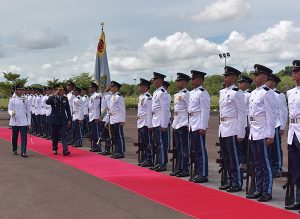Last week, Thailand’s new air force chief made his introductory visit to Brunei. While the scheduled trip was just one of a series of interactions between the two fellow Southeast Asian states, it nonetheless put the spotlight on the state of the defense aspect of their broader bilateral relationship.
As I have observed previously in these pages, Thailand and Brunei share a bilateral relationship that extends to the defense domain as well. Security ties include not just interactions, such as visits and exchanges, between the two countries directly but also multilateral ones, including within the framework of the Association of Southeast Asian Nations (ASEAN), where Thailand is holding the annually rotating chair during 2019 (a position Brunei will hold in 2021 after Vietnam’s turn in 2020). That has continued over the past few years as well amid domestic change in both countries, with Brunei seeing a round of leadership reshuffles and Thailand moving toward repeatedly delayed polls finally conducted earlier this year.
Last week, the defense aspect of the relationship was in the spotlight again with the visit of Thailand’s air force chief. Air Chief Marshal Maanat Wongwat, the commander in chief of the Royal Thai Air Force (RTAF), was in Brunei for an introductory visit in his current role, which was part of a broader swing to several Southeast Asian capitals since he took up his current role back in October.
Maanat’s trip consisted of a series of interactions. In terms of meetings, he had engagements with a range of Brunei officials, including Brigadier General Dato Seri Pahlawan Haji Hamzah bin Haji Sahat, the head of the Royal Brunei Air Force (RBAirF), who is also currently the acting commander of the Royal Brunei Armed Forces (RBAF), and Major General Dato Paduka Seri Haji Awang Halbi bin Haji Mohd Yussof, the second minister of defense (in Brunei, the defense minister portfolio continues to be held by Sultan Hassanal Bolkiah).
Per the official account of the meetings by Brunei’s defense ministry (MINDEF), the engagements saw both sides affirm the existing state of bilateral defense cooperation as well as discuss potential avenues for further collaboration. No further information was unveiled regarding specific areas of cooperation that may be pursued by the two countries.
Beyond these meetings, Maanat’s trip also saw him have other interactions as well. For instance, he was presented with the RBAirF Honorary Pilot Wing in recognition for this contribution to advancing ties between the RTAF and RBAirF, a development that MINDEF noted reflected a relationship between the two air forces characterized by “mutual understanding and camaraderie” deepened through exchanges and exercises.
Unsurprisingly, few additional details were publicly disclosed about the specifics of what both sides had addressed with respect to the defense relationship in terms of particularities. Nonetheless, as we head into 2020, this aspect of ties between the two countries will be important to watch amid wider developments for them both at home and abroad.

































